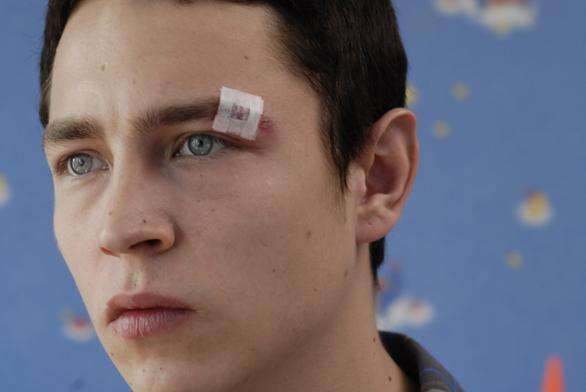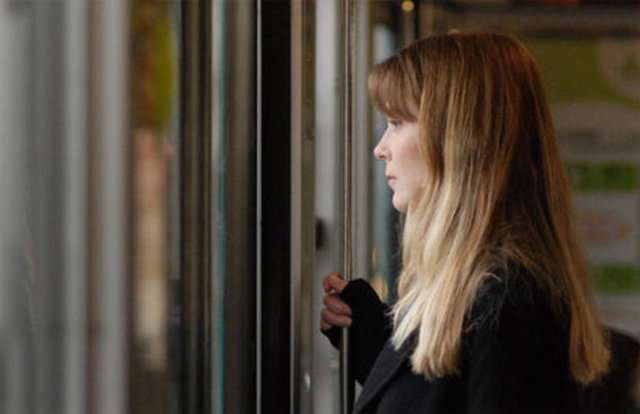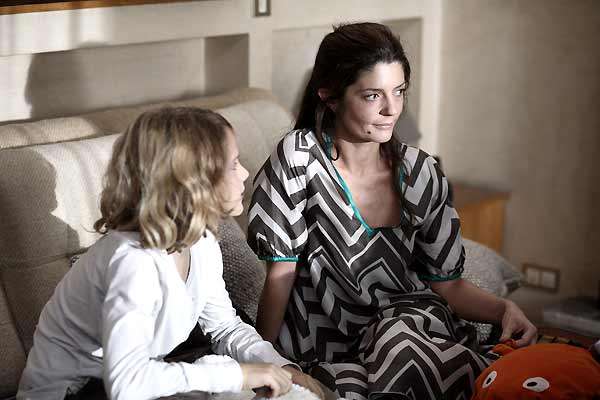-
Claude, Nathan Miller: I'm Glad That My Mother Is Alive (2009)

VINCENT ROTTIERS IN I'M GLAD THAT MY MOTHER IS ALIVE
Claude, Nathan Miller: I'm Glad That My Mother Is Alive (2009)
Identity crisis
Veteran French director Claude Miller collaborated in both writing and directing with his cameraman son Nathan for the latter's first directorial effort in this adaptation of a true story about a son abandoned by his mother who reconnects with her at age 20 with negative results. The up and coming young actor Vincent Rottiers adds considerably to the believability and complexity of the main role of the disturbed young man. This was a project delayed for thirteen years, originally under consideration by Jacques Audiard. Though the senior Miller's work can be pedestrian and derivative, the presence of his son's directorial hand breathes life into this impulsive, rather troubling effort. Finally the story however has a somewhat slight and anecdotal quality, though it shows the potential of Rottiers, also seen this year in Xavier Giannoli's exciting con-man story, In the Beginning/À l'origine.
The film begins with flashbacks that skip back and forth in time, beginning with the adoptive parents on holiday with Thomas and his younger brother Patrick/François when they are twelve and nine, respectively. Later flashbacks go further back to show scenes of the brothers with their birth mother and the day she signs off on their adoption at a foster care center. Thomas is four at time of adoption, his brother one. At twelve, Thomas Jouvet (Maxime Renard) is obsessed with finding his birth mother and blames his adoptive parents for his not knowing her. He's a handful to deal with, constantly acting out. Eventually he manages to persuade a registry office "fonctionnaire" to reveal his mother's name and coordinates and he goes to find his mother, Julie (Sophie Cattani), but bolts when she opens the door, pregnant, without recognizing him.
The adoptive parents, Yves ( Yves Verhoeven) and Annie (Christine Citti) are long-suffering; in fact there's a slight hint that Thomas' aggressive behavior may help push Yves into the depression that eventually leads to his being permanently institutionalized.
Annie, however, is strong and sweet, and when the narrative skips forward to eight years later when Thomas (now Vincent Rottiers) is twenty, now working as a garage mechanic and with his own car. He seems on the right track, and is a loving member of his adoptive family, sharing in visits to Yves, affectionate with Annie. François (Olivier Guéritée), now seventeen, probably doesn't even remember Julie and is a champion skirt-chaser. Thomas still keeps to himself, and one day looks up Julie, arriving with flowers and chocolates. She is still in the same flat but now alone with her young child.
A strange relationship develops in which Thomas seems to see Julie partly as his long-lost mom, partly as a potential girlfriend; the latter signaled by his addressing her as "vous" rather than "tu." From here for a while Thomas leads a double life, halfway moving in with Julie and her child, and halfway still the son of Annie, going back and forth, lying to Annie about another job and a girlfriend. The game doesn't last for long, and ends in a very unexpected way.
This awkwardly titled film is well done in its individual parts, and there's evidence of the senior Miller's skill in dealing with tales of troubled youth, but structurally it doesn't altogether fit together and the flashbacks assume a disproportionate role. It is either too long or too condensed. It might work better in two or three parts of a miniseries. Or the introductions might be somehow greatly compressed and the final segment, where the chemistry between Sophie Cattani, who plays the birth mother, and Vincent Rottiers, as the adult Thomas, the latter alive and yet dark and mysterious, makes for a troubling and suspenseful series of scenes -- which might better have come somewhere earlier rather than past the midway point.
Je suis heureux que ma mère sois vivante debuted at Venice and opened in Paris September 30, 2009. Understandably it got good, but not great reviews. It was shown as part of the March 2010 Rendez-Vous with French Cinema co-sponsored by uniFrance and The Film Society of Lincoln Center and shown at the Walter Reade Theater and IFC Center, New York.
Last edited by Chris Knipp; 02-17-2015 at 09:14 PM.
-
François Ozon: Le refuge (2010)

ISABELLE CARRÉ IN LE REFUGE
François Ozon: Le refuge (2010)
Skin deep
I.V. drug use and pregnancy don't mix, but that is a fact smoothed over in this chic meditation by François Ozon, who enlisted the actually pregnant Isabelle Carré as the lead. In the prologue, the innocent-looking Emile Berling is the dealer who brings a fatal dose that kills off boyfriend Louis (Ozon's Time to Leave star Melvil Poupaud) and lands girlfriend Mousse (Carré) in the hospital. There, awakening from a drug coma, she learns she is pregnant by Louis. A post-funeral interlude with Louis' posh family follows in which we learn he has a handsome gay brother, Paul (Louis-Ronan Choisy). The parents seem to differ sharply on which sibling they'd rather have given up; the father is devastated by Louis' early demise, the mother feels somehow vindicated. Eventually we get a glimpse at why, though in this pretty film, relationships are more talked about than acted out on screen.
Mousse moves to a spacious house in the country near the beach lent her by an older former lover, and here she leads a quiet but rather lonely existence, having groceries delivered by a local, Serge (Pierre Louis-Calixte). Along comes Paul on a visit. Uninvited and at first unwelcome, he nonetheless lingers for a while and hugs, talks, and a visit to an ear-splitting disco follow in which the two bond and details of their lives are revealed. Mousse gets an opportunity to process her relationship with Louis and achieve a degree of emotional closure. However, it seems Paul is a more appropriate parent for her child than she is. Even though he gets drunk a lot, spends his time on the beach, and has a fling with Serge, who turns out also to be gay.
Once we've gotten past Louis' and Mousse's empty flat and overused veins in the prolouge, Le refuge is beautiful to look at, and its melancholy happens in summer sunlight. It's an upscale, French version of a Hollywood movie, but with the punch-line scrupulously removed. It's just an exploration of themes. But what themes? Certainly drug addiction and pregnancy are not subjects treated in any depth. Using an actually pregnant actress and having various people touch or listen to her belly never keep this from being a strangely clueless tour of expectant motherhood. Mousse periodically quaffs vials of Methadone, but the significance of this for a pregnant woman is barely touched on. One wonders whether, were he not as handsome, suave, and sun-kissed, Paul's presence as a family therapist would be as welcome; or if all this would be so painless if the addict couple weren't from moneyed families.
Ozon isn't flip or stylistically playful as he is in films like Swimming Pool or 8 Women, or (most of all) Water Drops on Burning Rocks; this is more the serious vein of Time to Leave, and has a feeling that's more lyrical and sweet than any of these, perhaps a bit like Under the Sand. But there is a troubling sense of serious matters alluded to, but insufficiently addressed. Despite reference to such heavy stuff as drug addiction, single pregnancy, and loneliness, Le refuge (doesn't the title itself focus on escape?) makes them all seem too easy, assuaged by sun and sea and a handsome, conveniently undemanding gay man. Le refuge winds up being a vague, glossy advertisement for gay parenthood. In his mid-forties now, the prolific Ozon is moving toward more serious subject matter, but seriousness doesn't always mean depth. His moments of boldness may work better when they're a bit more flip and sassy. Le refuge winds up being flat and obvious, despite its elegance.
Le refuge was co-scripted by Ozon with Matthieu Hippeau. After going the rounds of some festivals (it won a special prize at San Sebastian), the film opened in Paris January 27, 2010 to generally lukewarm but not unkind reviews. It has gotten good international distribution and will be released in the US by Strand. It was part of the uni-France/Film Society of Lincoln Center series the Rendez-Vous with French Cinema in March 2010 with screenings at the Walter Reade Theater and IFC Center.
-
Rendez-vous 2010 summary

DONATIEN SONER AND CHIARA MASTROIANNI IN MAKING PLANS FOR LÉNA
Rendez-Vous 2010 Summary
Here are thumbnail reviews and my picks. It was a good year. No films quite to die for, no masterpieces or greatness but solid quality throughout with five real standouts and others well worth watching; nothing very outlandish. I'll try to let you know later in one place all the films that have coming US releases.
PICKS:
I was struck by the power of Rapt and In the Beginning, two films that show the French ability to take a genre film (both are crime thrillers of a sort), in both cases based on a little news item (fait divers) and turn it into something with considerable psychological depth, philosophical implications, and stylistic richness. Honoré, who has done stylish New-Wave-ish work in his Paris Trilogy, achieves a new level of complexity and maturity in Making Plans for Lena. Mademoiselle Chambon is a slight, but extremely delicate and sensitive film. Welcome (which like Mademoiselle Chambon stars the excellent Vincent Lindon) is an "issue" film of considerable warmth and authenticity. These are my top choices. Some of the others are worth seeing. See the details and ratings below. Note on the ratings: there's a big difference between an 8 and a 9; I don't give 10's to new films.
8 Times Up (Xabia Molia 2010) - 7/10
A sincere little first film about economic marginality focused on a man and woman. Fades somewhat in comparison with the recent Pierre Schöller film, Versailles, but shows some promise.
Army of Crime, The (Robert Guédiguian 2009) - 8/10
A very conventional but most interesting and well acted historical film about the foreigners in the early stages of the French resistance.
Farewell (Christian Carion 2009) - 5/10
A bland spy film. Important story (perhaps), but uninteresting details, mediocre film.
French Kissers, The (Riad Sattouf 2009) - 8/10
Lots of charm and detail in this comedy about French middle-school boys in search of love and sex, but for Americans, something is lost in translation.
Hedghog, The (Mona Achache 2009)--6/10
A very pat, slick little fable about three loveable "characters" with a message about originality and connecting. Art house pap.
I'm Glad That My Mother Is Alive (Claude and Nathan Miller 2009) - 7/10
Odd, slight, but momentarily strong story of a disturbed adopted boy who re-connects with his birth mother. Structural weaknesses; strong chemistry between young Vincent Rottiers and Sophie Cattani.
In the Beginning (Xavier Giannoli 2009) - 9/10
Stunning and suspenseful film about a con man whose swindle turns into doing good. Engrossing, with a strong cast. Tour de force performance by François Cluzet.
King of Escape, The (Alain Guiraudie 2009) - 4/10
Inexplicable meander, best forgotten.
Mademoiselle Chambon (Stéphane Brizé 2009) - 9/10
Delicate and very French study of two shy people who connect across a class/professional divide with superb acting.
Making Plans for Léna (Christophe Honoré 2009) - 9/10
Rich, unusually mature effort from the fertile hand of Honoré with a career-best performance by Chiara Mastroianni
OSS 117: Lost in Rio (Michel Hazanavicius 2009) - 8/10
The crew do their tongue-in-cheek French James Bond thing again with even more wit, cunning visuals, and provocative plot.
Rapt (Lucas Belvaux 2009) - 9/10
Like In the Beginning, this film turns a little news story into a film that transcends its genre (kidnap movie) and turns into something original and thought-provoking. Fine performance by Yvan Attal.
Regrets (Cédric Kahn 2009) - 8/10
A precipitous, over-the-top movie about crazy love, a renewed affair from decades earlier, for which Kahn deserves some credit for creating something rather original even if the result fades a bit in memory. Yvan Attal again.
Refuge, Le (François Ozon 2010) - 7/10
Ozon in a serious vein, but the film, though elegant and visually beautiful, feels superficial and uninvolving in its working out.
Restless (Laurent Perreau 2009 - 8/10)
Delicate debut film about two isolated people and two stories of lost love with an interesting cast including Michel Piccoli.
Thorn in the Heart, The (Michel Gondry 2010) - 7/10
Detailed and interesting documentary about the director's aunt doesn't quite dig deep enough.
Welcome (Philippe Lioret 2009 - 9/10)
Touching story about the plight of illegal immigrants with excellent direction and fine acting. Lioret gets everything right on this one. Vincent Lindon again fine.
Wolberg Family, The (Axelle Ropert 2009) - 7/10
Odd, stylish study of a politician pater familias who's lost touch with his family; promising first film that doesn't quite hold together.
Note: I did not see the program of new short films, and I did not review Jules Dassin's 1958 or 1959 The Law (AKA La legge or La loi), a film set in Italy but in French, with a lot of stars, including Gina Lollobrigida, Melina Mercouri, Pierre Brasseur, Marcello Mastroianni, and Yves Montand. As I quoted earlier somewhere, an Allociné comment calls this, with good reason, Jules Dassin's "worst film," "a disaster," and "to be avoided." From a novel by Roger Vailland, which, I believe,may be of some interest. But it's a career misstep, and there was no point in reviving it in a restored French soundtrack.
Last edited by Chris Knipp; 03-05-2010 at 08:26 PM.
 Posting Permissions
Posting Permissions
- You may not post new threads
- You may not post replies
- You may not post attachments
- You may not edit your posts
-
Forum Rules





 Reply With Quote
Reply With Quote


Bookmarks